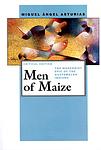Miguel Angel Asturias
Miguel Angel Asturias was a Guatemalan poet, novelist, and diplomat. He was born on October 19, 1899, and died on June 9, 1974. Asturias is known for his significant contributions to Latin American literature, particularly through his use of myth and folklore to address social injustice and political issues. His most famous works include 'El Señor Presidente', which depicts life under a ruthless dictator, and 'Hombres de Maíz', which is considered a masterpiece of indigenous literature. In 1967, he was awarded the Nobel Prize in Literature for his vivid literary achievement, rich with symbols and reflecting his commitment to social change.
Books
This list of books are ONLY the books that have been ranked on the lists that are aggregated on this site. This is not a comprehensive list of all books by this author.
-
1. The President
The novel in question is a gripping political drama set in an unnamed Latin American country, where a ruthless dictator wields absolute power. The narrative delves into the dark and corrupt world of political machinations following the assassination of a colonel, which triggers a series of events that expose the brutal and oppressive regime. Through the eyes of various characters, including the paranoid president, the falsely accused, and the oppressed citizens, the story explores themes of power, fear, and injustice, painting a vivid picture of a society under the thumb of a tyrannical leader. The book is a powerful critique of dictatorship and a poignant exploration of the human cost of absolute power.
The 1888th Greatest Book of All Time -
2. Men Of Maize
The book is a magical realist novel that delves into the lives, traditions, and struggles of the indigenous people of Guatemala, intertwining their personal stories with the mythic and spiritual beliefs rooted in their connection to the land, particularly the cultivation of maize. The narrative, rich in symbolism and poetic language, explores the impact of modernization and exploitation on rural communities, critiquing the forces of colonialism and capitalism that disrupt the harmony between humans and nature. Through a series of interconnected tales, the novel paints a vivid portrait of a culture in transition, grappling with the loss of its identity and the fight to preserve its heritage.
The 7152nd Greatest Book of All Time

